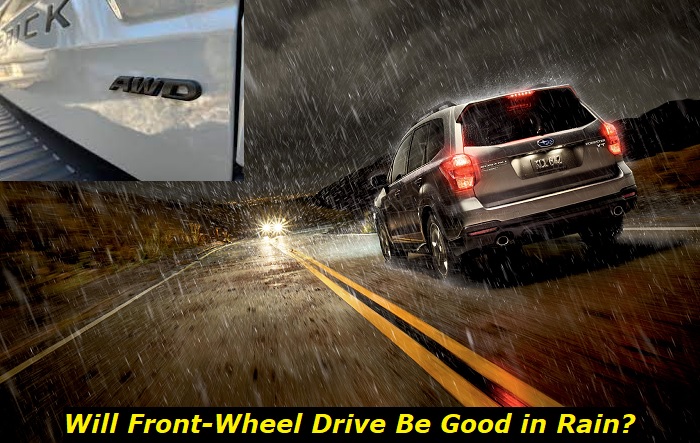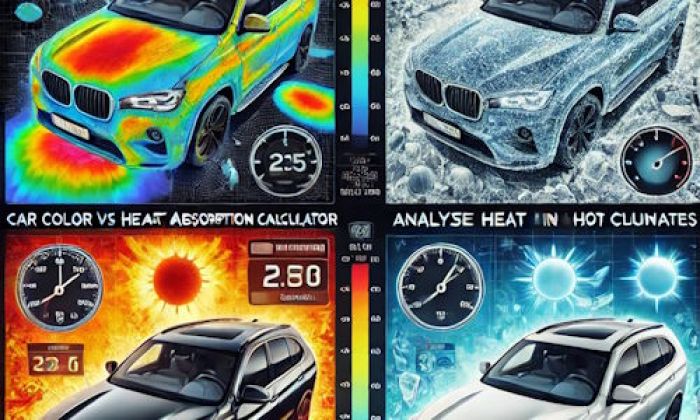When you are about to buy a car, mainly an SUV, you usually have a choice between AWD (4WD) or front-wheel drive. Traditionally, American people tend to buy all-wheel-drive cars because they have better traction, and are much more confident when off-roading or when the weather conditions are harsh. But what about rainy weather?
When you are driving on a wet road during rain, the front-wheel drive can be a little less convenient for traction and handling, but other technologies will not let your car lose traction. There are ABS, ESP, ESC, anti-skid systems, traction control systems, etc. All these features are used to keep your car on the road and compensate for the absence of the 4-wheel drive.

n this article, I will cover the following topics:
- Front-wheel drive and rain - what are the concerns?
- Should you choose an AWD car for rainy regions?
- What are the technologies that work well on the rainy road?
- What are some cool advantages of front-wheel drive in cars?
Let's get started!
Front-wheel drive and rain - are they friends or enemies?
That's quite obvious that the lists of safest SUVs will include vehicles with AWD - just because good SUVs all come with AWD. But what about smaller cars? Carfax recently published a refreshed list of the safest small cars (you can google for it) and I couldn't see any vehicle that is offered with all-wheel drive. If AWD is as important for safety as everyone now tends to think, why don't all good cars come with AWD?
Because this is a myth. A myth that makes you pay more money for a car with AWD whereas you don't need AWD ever in your life because 99.9% of the time your new vehicle is going to spend on a good and smooth road. Even if it's covered with ice, it doesn't make much difference because all good cars are equipped with dozens of technologies that help you drive safely.
So, here's what you should know about front-wheel drive in the rain:
- the FWD cats are good on slippery or wet roads, they are almost as good as any AWD vehicle out there;
- AWD, in turn, is better for snowy roads, sand, gravel, or mud, but when it comes to wet asphalt or concrete, there is almost no difference;
- you will be supported by the traction control and stability control systems that will keep your car firmly on the road;
- before the vehicle is about to go into the skid, these systems will apply brakes on certain wheels automatically and you will get full control over your car;
- also, FWD allows you to easily adjust the traction just by slightly turning the steering wheel and adjusting the throttle with the gas pedal;
- although your rear wheels don't have any power on them, I can't imagine the situation when you will need this on a rainy day.
A lot of bloggers tell us about the situation when you go into a deep puddle and the AWD turns on to keep the traction. Well, AWD will not help if the puddle is really deep and your car will still lose traction if the wheels do not touch the ground. Should you have the best drive system in the world, you will completely lose control over your car.
Also, in such situations, all the safety systems kick in and try to block the wheels from spinning faster than needed. So once the wheels touch the road again and can get back some traction, they will grip on the road and you will get back the control. It doesn't matter in this case whether you have AWD or FWD cars.
What about RWD and rain?
I'm not going to talk a lot about RWD. If you don't have enough driving experience, better avoid buying vehicles with rear-wheel drive. They are much harder to handle and steer, they require more attention and understanding of how the car reacts on certain road conditions. Without this, driving an AWD car on a slippery or wet road may lead to serious issues and even accidents.
Unless it's a luxury car with hundreds of different safety options that will still keep traction whatever happens.
Should you still choose AWD for rainy regions?
If there is a lot of rain in your region, you may consider AWD cars. But as we already know from previous parts of this article, there is no need to overpay because you will not get literally any privileges or advantages with the AWD system.
If you live in a region with deserts and there is a chance that you get on the sand or if there is a lot of snow on the roads in your town in winter, then it makes sense to buy a car with an all-wheel drive.
Also, you may want an AWD vehicle in such cases:
- you like going fishing or hunting and want to use your car for this;
- you want to get to the nature with your family and will need to go off the road sometimes;
- you are living on a ranch and need to cope with different road conditions in the area;
- you love off-roading and think that you will use the car you buy to go to some challenging areas.
Other than that, you will not use the privileges of AWD and there is no sense for you to pay for this. Also, you may find out that the AWD system in your car never activates just because you never take your vehicle into situations when it would be necessary.
I have a personal example. Previously I had the Fiesta which, of course, had front-wheel drive. I drove it in quite challenging conditions in all seasons and it succeeded in driving through all of them. Later, I got the CR-V AWD and got stuck in the mud the next day after I bought this car because it just sat on its belly and I couldn't drive.
What are the important technologies for rainy roads?
When you are driving a lot in the rain, you should choose a car that has several important safety technologies. AWD is good for certain conditions, but it won't help you a lot in rain. You may have the best kind of AWD but turn off the traction control and your car will go skidding on the slippery wet road.
So, here are the technologies that will certainly help you on the wet road:
- ABS - this is the braking technology that corrects the braking power on each wheel without letting it get blocked;
- ESP - this is the Electronic Stability Program, often called ESC - Electronic Stability Control - the system improves the stability of your vehicle on the road;
- TCS - this is the Traction Control System that uses all previously mentioned technologies to maintain the traction of the vehicle;
- drive modes in the transmission - it will help if you can choose the snow mode on slippery or extremely wet roads.
These technologies are today common for almost all modern vehicles. Even if your transmission doesn't have drive modes to choose from, the car obviously has ABS plus ESP and most likely also offers TCS of some type. This will allow you to drive on a wet road without losing control over your car.
Be careful and don't deactivate the helpful safety systems when you are driving in the rain. If you deactivate the stability control system by pressing the special button in your vehicle, your car may lose traction. Rear wheels will uncontrollably sway to the sides especially when going over relatively deep puddles on the road.
What are some advantages of the front-wheel drive?
After owning several vehicles with FWD and two cars with AWD, I can tell you that there is no difference for the vast majority of drivers. If you don't go off-roading to the mountains and aren't living in a remote ranch or in a desert, then paying for AWD doesn't make sense to you.
But what are some other advantages of having an FWD vehicle? Here they are:
- your gas mileage will be significantly better than in the same car with AWD;
- you will pay less for maintenance - there are no differentials and transfer cases in the rear part of the car;
- you have fewer chances of getting a serious problem with expensive repair - the car just has fewer parts in it;
- the vehicle will be faster than the AWD version.
It's important to weigh in all the advantages and possible flaws of your vehicle before you pay money for it. Of course, this is not the purchase for the lifetime, but still, you want to be sure that you will get the maximum out of your investment.
Final thoughts
The problem of choosing between AWD and FWD cars is extremely old. But if you take a 20-year-old vehicle without proper safety technologies and electronic controls, then the AWD option will be much better and safer. If you are considering two new cars, the type of drive shouldn't at all be the thing to worry about.
Also, buying an AWD car is important when you have some plans for it. Like driving in the deep snow or sand, going to the ranch in the middle of nowhere, or off-roading. If nothing of these is in your plan for the vehicle you buy, you may go for the front-wheel drive and not worry about its traction in the rain.
About the authors
The CarAraC research team is composed of seasoned auto mechanics and automotive industry professionals, including individuals with advanced degrees and certifications in their field. Our team members boast prestigious credentials, reflecting their extensive knowledge and skills. These qualifications include: IMI: Institute of the Motor Industry, ASE-Certified Master Automobile Technicians; Coventry University, Graduate of MA in Automotive Journalism; Politecnico di Torino, Italy, MS Automotive Engineering; Ss. Cyril and Methodius University in Skopje, Mechanical University in Skopje; TOC Automotive College; DHA Suffa University, Department of Mechanical Engineering






Add comment